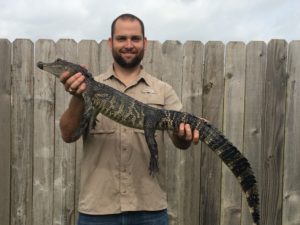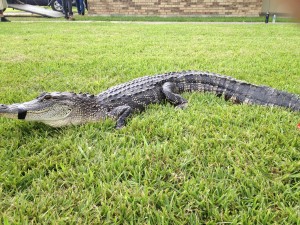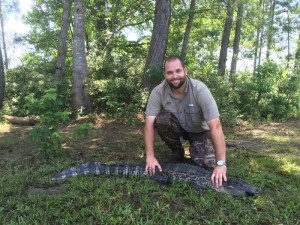 Alligator removal should always be left to the experts at Wildernex Wildlife Control. American alligators were once very common in water bodies across East and South Texas. Unregulated hunting and habitat destruction heavily depleted the population in Texas in the 1950’s. The protection of alligators, habitat management, and new water impound projects have aided in rapid population expansion across Texas in recent years. These factors combined with rapid urban sprawl continues to contribute to increased nuisance alligator conflicts. Many Texas residents live in close proximity to these native alligators with no conflicts; however, there are often alligators that can become a nuisance and must be handled by a licensed Nuisance Alligator Control Permit holder such as Wildernex LLC. Many alligators have the ability to be relocated while some alligators may lose their fear of humans and exhibit aggressive behavior and may be required by Texas Parks and Wildlife to be euthanized. Any alligators that have been fed by humans will be deemed inadequate to relocate and
Alligator removal should always be left to the experts at Wildernex Wildlife Control. American alligators were once very common in water bodies across East and South Texas. Unregulated hunting and habitat destruction heavily depleted the population in Texas in the 1950’s. The protection of alligators, habitat management, and new water impound projects have aided in rapid population expansion across Texas in recent years. These factors combined with rapid urban sprawl continues to contribute to increased nuisance alligator conflicts. Many Texas residents live in close proximity to these native alligators with no conflicts; however, there are often alligators that can become a nuisance and must be handled by a licensed Nuisance Alligator Control Permit holder such as Wildernex LLC. Many alligators have the ability to be relocated while some alligators may lose their fear of humans and exhibit aggressive behavior and may be required by Texas Parks and Wildlife to be euthanized. Any alligators that have been fed by humans will be deemed inadequate to relocate and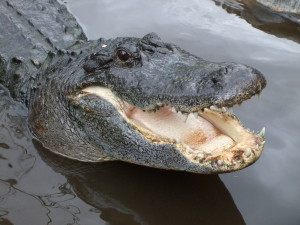 will be required to be euthanized. It is illegal to ever feed or attempt to feed a wild alligator. There are extensive state and federal laws protecting alligators in the state of Texas. If you encounter an alligator, do not attempt to handle the situation yourself. Failure to follow these laws can result in substantial fines and possible imprisonment. By law, the control of nuisance alligators must be performed by a licensed Nuisance Alligator Control Permit holder. Wildernex LLC has received all training and licensing by Texas Parks and Wildlife Department to legally capture and remove nuisance alligators. The current legal definition of a nuisance alligator is “an alligator that is depredating [killing livestock or pets] or a threat to human health or safety” under definitions laid out in the Texas Administrative Code (Title 31, Part 2, Chapter 65, Section 65-352). If you have a nuisance alligator(s) on your property that needs to be removed, please contact Wildernex LLC to receive further instruction about the control of nuisance alligators and the legal process to have the alligator(s) captured and removed.
will be required to be euthanized. It is illegal to ever feed or attempt to feed a wild alligator. There are extensive state and federal laws protecting alligators in the state of Texas. If you encounter an alligator, do not attempt to handle the situation yourself. Failure to follow these laws can result in substantial fines and possible imprisonment. By law, the control of nuisance alligators must be performed by a licensed Nuisance Alligator Control Permit holder. Wildernex LLC has received all training and licensing by Texas Parks and Wildlife Department to legally capture and remove nuisance alligators. The current legal definition of a nuisance alligator is “an alligator that is depredating [killing livestock or pets] or a threat to human health or safety” under definitions laid out in the Texas Administrative Code (Title 31, Part 2, Chapter 65, Section 65-352). If you have a nuisance alligator(s) on your property that needs to be removed, please contact Wildernex LLC to receive further instruction about the control of nuisance alligators and the legal process to have the alligator(s) captured and removed.
If you think you have a nuisance alligator, please follow these guidelines below to better determine the situation:
- In spring and summer, alligators are moving to breed and find new habitat. Most of the alligators moving around are smaller ones that have been pushed out of their normal habitat by larger alligators.
- If you hear an alligator hiss, it’s a warning that you are too close.
- If you have a close encounter with an alligator a few yards away, back away slowly. Alligators can run up to 35 miles per hour for short distances on land. Never make the mistake of thinking that an alligator is slow and lethargic. Alligators are extremely quick and agile and will defend themselves when cornered. A female protecting her nest might charge a person who gets close to the nest.
- It is not uncommon for alligators to bask along the banks of a pond or stream for extended periods of time. These alligators are usually warming their bodies; they are not actively hunting. Often times a basking alligator may be seen with its mouth open; this is a way to cool its body temperature down, since alligators do not pant or sweat. (In some cases, the alligator may be protecting a nest – see below.) An alligator may be considered a nuisance if it leaves the banks of the water body to spend time near homes, livestock pens, or other structures.
- If you walk near the water and an alligator comes straight toward you, especially if it comes out of the water, it is definitely a nuisance alligator that needs to be reported to Wildernex LLC. In many cases, these are alligators that have been fed by people or have been allowed to get human food.
- If you see an alligator while walking a pet make sure that your pet is on a leash and under your control. Your pet will naturally be curious, and the alligator may see your pet as an easy food source. Alligators have a keen sense of smell. In areas near alligator sightings it is wise to keep pets inside a fenced area or in the house for a few days.
- If you see an alligator in the roadway, DO NOT attempt to move it! Notify Wildernex LLC or the local authorities so the alligator can be handled safely.
- If you see a large alligator in your favorite swimming hole or pond, do not swim with it. Although alligator attacks in Texas are rare, it can happen. The “attack” reports in Texas are usually more accurately described as “encounters.” As with all outdoor activities, realize that wildlife encounters are a possibility.
- Alligators that repeatedly follow boats, canoes, or other watercraft, and/or maintain a close distance without submersing may be considered nuisance alligators.
- If you see a nuisance alligator, consider why it is there. Did someone clean fish and throw the heads into a pond or river? If so, they created a potential alligator problem and could be breaking state regulations. Since October 1, 2003, it has been a Class C misdemeanor punishable by a fine of up to $500 for anyone caught feeding an alligator.
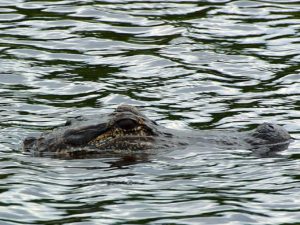 DOs AND DON’Ts FOR LIVING WITH ALLIGATORS
DOs AND DON’Ts FOR LIVING WITH ALLIGATORS
Adapted from “Living with Alligators,” Florida Fish and Wildlife Commission Don’t – kill, harass, molest or attempt to move alligators. State law prohibits such actions, and the potential for being bitten or injured by a provoked alligator is high. Do – call Wildernex LLC if you encounter a nuisance gator that has lost its fear of people. Don’t – allow small children to play by themselves in or around water. Do – closely supervise children when playing in or around water. Don’t – swim at night or during dusk or dawn when alligators most actively feed. Do – use ordinary common care. Swim only during daylight hours. Don’t – feed or entice alligators. Alligators overcome their natural shyness and become accustomed or attracted to humans when fed. It is now a Class C misdemeanor, punishable by a fine of up to $500, to intentionally feed an alligator. Do – inform others that feeding alligators creates problems for others who want to use the water for recreational purposes. Don’t – throw fish scraps into the water or leave them on shore. Although you are not intentionally feeding alligators, the end result can be the same. Do – dispose of fish scraps in garbage cans at most boat ramps or fish camps. Don’t – remove any alligators from their natural habitat or accept one as a pet. It is a violation of state law to do so. Alligators do not become tame in captivity and handling even small ones may result in bites. In particular, never go near baby alligators or pick them up. They may seem cute and harmless, but mama alligator will be nearby, and will protect her clutch for at least two years. Do – enjoy viewing and photographing wild alligators from a safe distance of at least 30 feet or more. Remember that they’re an important part of Texas’s natural history, as well as an integral component of many wetland ecosystems.
Have questions about wildlife control? Check out our FAQ page or contact us for your answers!

